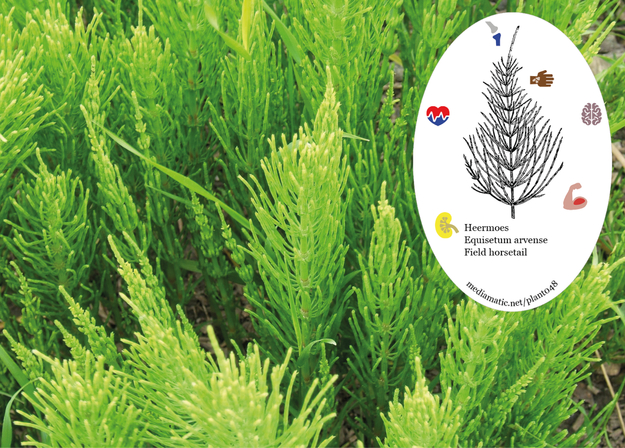Horsetails have an unusual chemistry compared to most other plants. They are rich in silica, contain several alkaloids (including nicotine) and various minerals. Horsetail is very astringent and makes an excellent clotting agent, staunching wounds, stopping nosebleeds and reducing the coughing up of blood. It helps speed the repair of damaged connective tissue, improving its strength and elasticity. The plant is anodyne, antihaemorrhagic, antiseptic, astringent, carminative, diaphoretic, diuretic, galactogogue, haemostatic and vulnerary. The green infertile stems are used, they are most active when fresh but can also be harvested in late summer and dried for later use. Sometimes the ashes of the plant are used. The plant is a useful diuretic when taken internally and is used in the treatment of kidney and bladder problems, cystitis, urethritis, prostate disease and internal bleeding, proving especially useful when there is bleeding in the urinary tract. A decoction applied externally will stop the bleeding of wounds and promote healing. It is especially effective on nose bleeds. A decoction of the herb added to a bath benefits slow-healing sprains and fractures, as well as certain irritable skin conditions such as eczema. The plant contains equisetic acid, which is thought to be identical to aconitic acid. This substance is a potent heart and nerve sedative that is a dangerous poison when taken in high doses. This plant contains irritant substances and should only be used for short periods of time. It is also best only used under the supervision of a qualified practitioner. A homeopathic remedy is made from the fresh plant. It is used in the treatment of cystitis and other complaints of the urinary system. The German Commission E Monographs, a therapeutic guide to herbal medicine, approve Equisetum arvense for urinary tract infections, kidney & bladder stones, wounds & burns. Source: https://pfaf.org/
Field horsetail
Equisetum arvense
Find more about this plant on Wikipedia.
